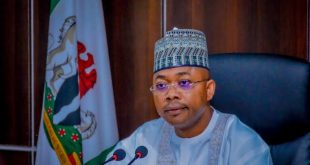A report has revealed that corruption is the biggest national challenge facing democratic governance in Nigeria and a number of other countries,
The report, titled ‘Open Society Barometer’ by a non-governmental organisation, Open Society Foundations, says “democracy remains the most popular form of government globally,” with 86 per cent of respondents in a survey wanting to live in a democratic state and nearly two-thirds (62 per cent) preferring it over any other system.
The Open Society Barometer serves as a global reality check, asking people each year about the issues affecting their lives, communities, countries and how best to address them.

In this year’s report, the Open Society Foundations surveyed 36,344 respondents across 30 countries between May 18 and July 21, 2023.
The focus of the survey is to determine people’s faith in democratic governance in the face of recent threats by coup det’at and interference by authoritarianism.
The countries surveyed include Argentina, Bangladesh, Brazil, China, Colombia, Egypt, Ethiopia, France, Germany, Ghana, India, Italy, Japan, Kenya, Malaysia, Mexico, Nigeria, Pakistan, Poland, Russia, Saudi, Arabia, Senegal, South Africa, Sri Lanka, Tunisia, Turkey Ukraine, United Arab Emirates, United Kingdom, and the United States.
According to the report, the countries, which are chosen to reflect economic, geographic, and political diversity, “have a combined population of 5.5 billion people.”
The report reads in part, “In each country, we aimed to survey a statistically representative sample of 1,000 people, tailoring questions to national contexts where appropriate, and providing definitions of keywords such as ‘democracy’ and ‘authoritarianism’.”
“The reports of democracy’s demise are greatly exaggerated,” the report says.
“In fact, it (democracy) has a strong pulse. And the gravest threat it faces is not the rival appeal of authoritarianism but rather the question of whether democratic leaders can deliver for their populations.
“People want to believe in open societies in which checks on power, pluralistic and independent institutions, minority protections, and individual rights enable all to participate.
“With the rise of authoritarianism and populism, new debates about the relative efficacy of rival systems of government, and the acceleration of the so-called ‘polycrisis,’ it is easy to conclude that democracy is doomed to decline. But our polling shows a broad and enduring faith in its principles among the global public.”
The report reveals that even though there are several challenges facing democratic governance globally, 86 per cent of respondents prefer it to authoritarianism.
Ninety-two per cent of respondents from Nigeria say it is important for them to live in a country that is democratically governed, while 69 per cent prefer democracy to other systems of government.
Challenges identified as facing countries in the world include human rights violations, climate change, corruption, poverty, inequality, and political violence, among others.
“Corruption beats climate change and poverty and inequality when respondents were asked about the most important challenge facing their country. Almost a quarter of people (23 per cent) chose this answer and nearly a fifth (19 per cent) said that corruption was the issue with the biggest impact on their life.
“Corruption at a national level ranked highest as a priority in Africa and Latin America but was also prominent in Asia and Russia,” the report reveals.
This has led to a lack of trust in politicians by the people.
Only 27 per cent of respondents in Nigeria trust politicians to work in their best interests.
“Unsurprisingly, people who believed corruption to be the most important challenge in their country were more likely to distrust national or local politicians,” according to the report.
It adds, “But distrust is prominent across age groups and geographies. When compared to religious leaders, leaders of international institutions (e.g., the UN, the EU, the African Development Bank), journalists, business leaders, and charity leaders, most respondents believed local and national politicians were the least likely to work in their best interests.
“Of the institutions represented, respondents most trust charity leaders (51 per cent), followed by leaders of international institutions and religious leaders (both 45 per cent).
“People from low- and lower-middle income countries were the most likely to trust leaders of international institutions, with the highest levels of trust in Bangladesh (81 per cent), Kenya (72 per cent), Ethiopia (69 per cent), India (68 per cent), and Nigeria (67 per cent).
“Meanwhile, people in the United Kingdom (26 per cent), France (24 per cent), Germany (24 per cent), Japan (21 per cent), and Russia (15 per cent) were the most distrustful.”
Other issues such as poverty and inequality also take prominence among global challenges.
The report states, “People in all countries polled face many of the same challenges, and more than half (53 per cent) feel their country is headed in the wrong direction. Presented with six different issues, respondents were evenly split among the three or four they deemed most important in their country, in the world, and in terms of their impact on their daily lives.
“But globally, the largest share of people polled (21 per cent) said, ‘poverty and inequality’ has the most impact on them personally. This was true of both Senegal—the smallest economy surveyed, where 26 per cent ranked poverty and inequality first—and the United States—the largest economy surveyed, where 19 per cent did.
“Similarly, food insecurity and hunger affect people in high- and lower-income countries. Across the 30 states surveyed, nearly half (49 per cent) of respondents said they have struggled to feed themselves or their families within the last year. In Bangladesh, as in the United States, 52 per cent of people agreed with this statement.”
(Punch)



